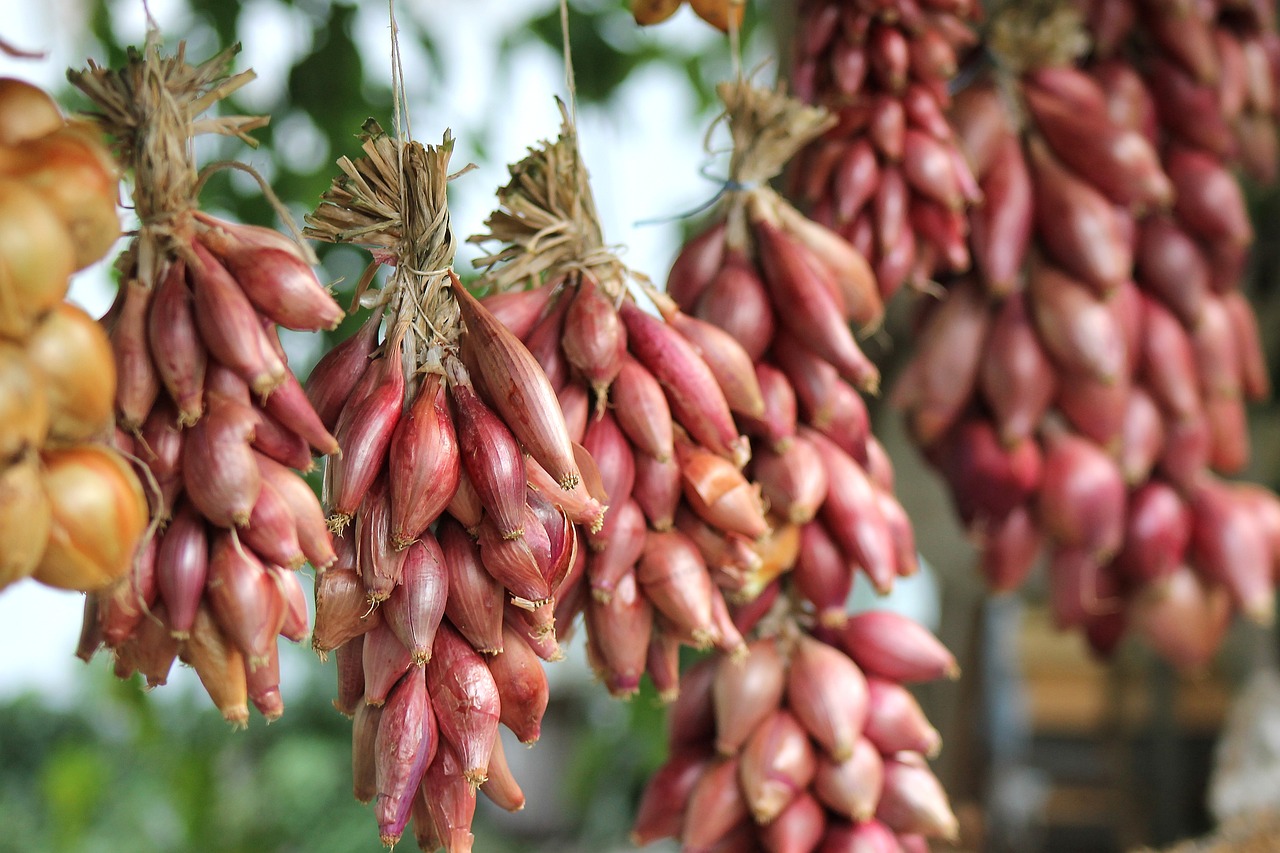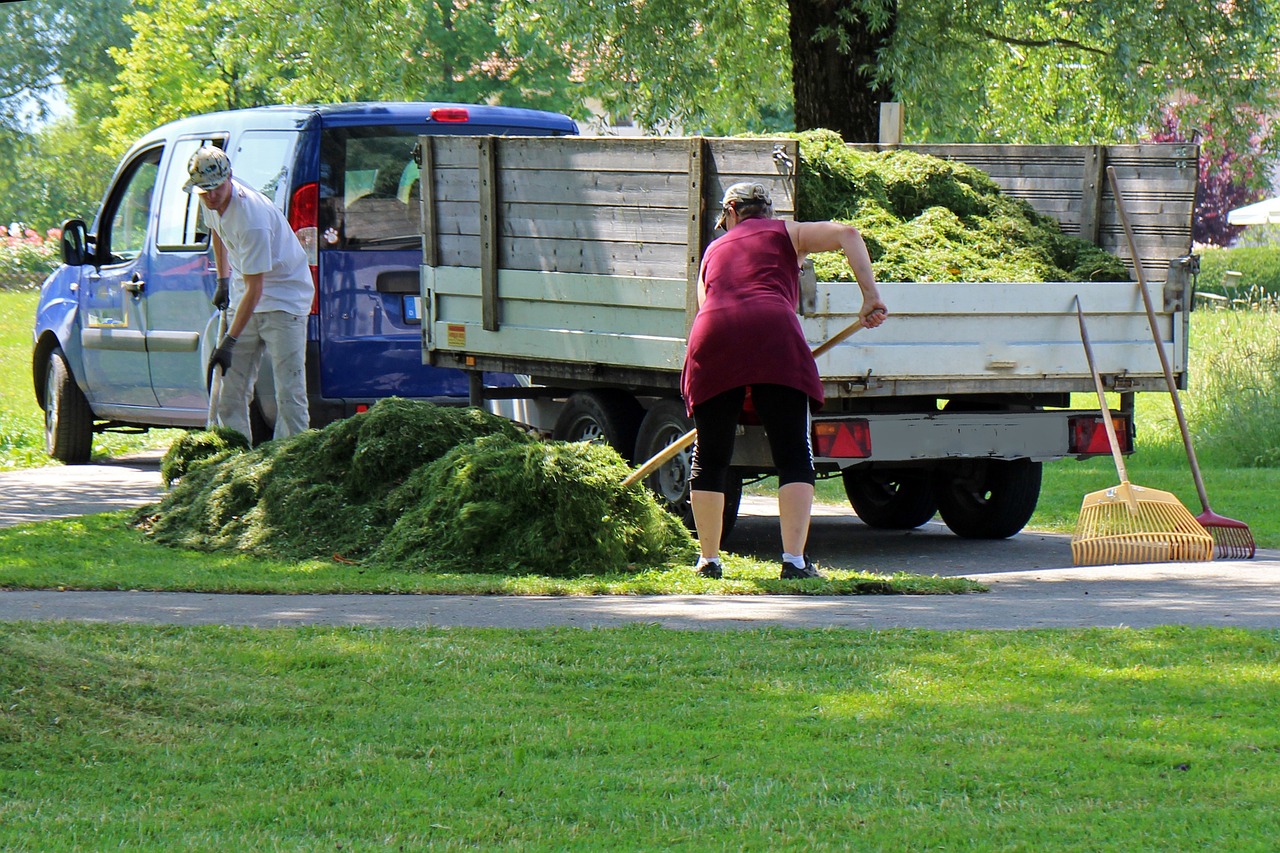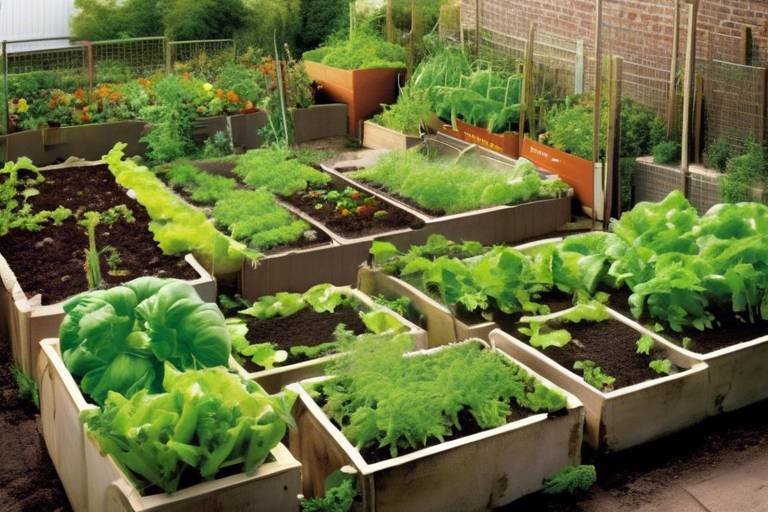The Benefits of Urban Gardening - Grow Your Own Food
Urban gardening offers a plethora of benefits that go beyond just growing plants; it's a lifestyle that can transform communities and individuals alike. By cultivating your own food in urban environments, you not only reap the rewards of fresh produce but also contribute to sustainability, community building, and personal well-being.
Imagine stepping outside your door and plucking a ripe tomato or fragrant basil leaves for your dinner salad. Urban gardening provides unparalleled access to fresh fruits, vegetables, and herbs right at your fingertips. No need to drive to the store or worry about the quality of your produce when you can grow it yourself.
Furthermore, urban gardening plays a vital role in promoting sustainability in our increasingly urbanized world. By reducing food miles, carbon footprint, and food waste, urban gardeners are actively participating in environmental conservation. Every seed planted in a city garden contributes to a greener, more sustainable future.
One of the most remarkable aspects of urban gardening is its ability to foster a sense of community among city dwellers. Through shared gardens, knowledge exchanges, and communal spaces, urban gardening brings people together, bridging gaps and creating bonds that transcend traditional boundaries.
Not only does growing your own food provide physical nourishment, but it also nourishes your mental well-being. The act of gardening has been proven to reduce stress, increase physical activity, and improve overall mental health. In a fast-paced urban environment, the tranquility of a garden oasis can be a powerful antidote.
Financially speaking, urban gardening can lead to significant cost savings. By growing your own produce, you can slash your grocery bills and support local economies through farmers' markets and community-supported agriculture. It's a win-win situation for your wallet and the community.
Even in the smallest of spaces, urban gardening enthusiasts find ways to cultivate greenery. From vertical gardens on walls to container gardens on balconies and even rooftop gardens, there are endless possibilities for maximizing limited urban space. With a bit of creativity, any corner can be transformed into a thriving garden.
Furthermore, urban gardening has a positive environmental impact, contributing to the conservation of green spaces, biodiversity, and natural resources. By creating pockets of greenery in concrete jungles, urban gardeners play a crucial role in preserving the planet for future generations.
Lastly, urban gardening provides valuable educational opportunities for individuals of all ages. Whether learning about plant care, nutrition, or environmental stewardship, urban gardens serve as living classrooms that impart essential skills and knowledge. It's a hands-on education that benefits both the individual and the community at large.

Increased Access to Fresh Produce
Urban gardening offers a unique opportunity for individuals to increase their access to fresh produce right at their doorstep. By cultivating fruits, vegetables, and herbs in urban settings, individuals can enjoy the convenience of harvesting their own organic produce without having to travel to grocery stores. This direct access to fresh ingredients not only enhances the quality of meals but also promotes a healthier lifestyle.
Furthermore, urban gardening allows individuals to have a deeper connection with their food, knowing exactly where it comes from and how it is grown. This transparency in the food production process can lead to increased trust and satisfaction in the quality of the produce consumed. Additionally, the ability to pick fresh produce as needed can reduce food waste, as individuals can harvest only what they require at any given time.
In urban environments where space is limited, innovative gardening techniques such as vertical gardening, container gardening, and rooftop gardens can be utilized to maximize productivity. These creative solutions enable individuals to grow a variety of crops even in small spaces, ensuring a diverse and abundant supply of fresh produce throughout the year.

Sustainability in Urban Environments
Discover the advantages of urban gardening, including sustainability, access to fresh produce, community building, stress relief, and cost savings.
Urban gardening plays a crucial role in promoting sustainability within city landscapes. By cultivating fruits, vegetables, and herbs locally, urban gardeners significantly reduce the carbon footprint associated with transporting produce from rural areas to urban centers. This practice, known as reducing food miles, not only decreases greenhouse gas emissions but also helps combat climate change. Additionally, urban gardening minimizes food waste by allowing individuals to harvest only what they need, reducing the amount of produce that goes unsold or uneaten.
Furthermore, urban gardens contribute to the creation of green spaces in concrete jungles, enhancing biodiversity and supporting urban wildlife. These green oases serve as vital habitats for insects, birds, and other creatures, fostering a more ecologically balanced urban environment. By preserving natural resources and promoting environmental conservation, urban gardening acts as a sustainability beacon in bustling city settings.
Moreover, many urban gardeners embrace sustainable gardening practices such as composting organic waste to enrich the soil, using rainwater harvesting systems to reduce water consumption, and employing natural pest control methods to minimize the reliance on harmful chemicals. These eco-friendly approaches not only benefit the environment but also inspire others to adopt more sustainable lifestyles, creating a ripple effect of positive change within urban communities.
Through the lens of sustainability, urban gardening emerges as a powerful tool for transforming concrete landscapes into vibrant, eco-conscious havens that nurture both people and the planet.

Community Building Through Gardening
Urban gardening goes beyond just growing plants; it cultivates a sense of community among individuals with a shared passion for gardening. Imagine a bustling city street transformed into a vibrant garden where neighbors come together to plant, nurture, and harvest. This shared activity creates a bond that transcends individual differences, fostering connections and friendships.
Through gardening, people not only share gardening tips and tricks but also exchange stories, recipes, and produce. It becomes a hub of knowledge where seasoned gardeners mentor beginners, and everyone learns from each other's experiences. This collaborative environment promotes a spirit of cooperation and support, enhancing the social fabric of the community.
Furthermore, community gardens often host events like harvest festivals, workshops, and potluck gatherings, providing opportunities for residents to interact and celebrate their collective efforts. These events strengthen relationships, build trust, and instill a sense of belonging among participants. Gardening becomes a common ground where diverse individuals come together, united by their love for plants and the earth.
Moreover, community gardens can serve as a platform for addressing broader social issues and promoting sustainability initiatives. By working together towards a common goal of creating green spaces and promoting environmental stewardship, participants contribute to the well-being of both the community and the planet. The act of gardening becomes a catalyst for positive change, inspiring collaboration and shared responsibility.

Health Benefits of Growing Your Own Food
Urban gardening offers a plethora of advantages that go beyond just growing plants. From sustainability to stress relief, this practice has the power to transform not only your surroundings but also your lifestyle. Let's delve into the various benefits that urban gardening brings to the table.
Imagine stepping outside your door and plucking fresh, ripe tomatoes or fragrant herbs for your meals. Urban gardening provides the convenience of having a mini-farm right at your fingertips, ensuring a daily dose of nutritious produce without the need to visit a grocery store.
By engaging in urban gardening, you actively contribute to sustainable living practices. The reduction in food miles, carbon footprint, and food waste associated with growing your own food in urban areas plays a significant role in promoting environmental conservation and resource efficiency.
Urban gardening serves as a catalyst for community engagement and connection. It brings together individuals from diverse backgrounds, fostering a shared passion for gardening and creating a platform for knowledge exchange and mutual support.
When you grow your own food in urban settings, you not only nurture your plants but also your well-being. The physical activity involved in gardening, coupled with the joy of watching your plants flourish, can significantly reduce stress levels and promote mental wellness. It's a therapeutic journey that benefits both body and mind.
One of the most tangible advantages of urban gardening is the potential for cost savings. By growing your own food, you can slash your grocery bills and contribute to local economies through farmers' markets and community-supported agriculture initiatives. It's a win-win situation for your wallet and the community.
Living in a bustling city with limited space? Urban gardening offers innovative solutions to make the most of every inch. From vertical gardens adorning walls to container gardening on balconies and rooftops, there are endless possibilities to transform urban spaces into green havens.
Urban gardening plays a vital role in enhancing the urban ecosystem. By creating green spaces, promoting biodiversity, and preserving natural resources, urban gardeners contribute to a healthier environment for current and future generations.
Engaging in urban gardening is not just about growing plants; it's also a journey of learning and discovery. From understanding plant care techniques to grasping the importance of nutrition and environmental stewardship, urban gardening offers a holistic educational experience for individuals of all ages.
Have more questions about urban gardening? Check out our FAQ section below for answers to common queries:
- How much space do I need to start urban gardening?
- What are the best plants to grow in urban environments?
- How can I deal with pests in my urban garden?
- Is urban gardening suitable for apartment dwellers?

Cost Savings and Economic Benefits
Urban gardening not only offers the joy of cultivating your own food but also provides significant . By growing your fruits, vegetables, and herbs in urban settings, you can reduce your grocery bills while contributing to the local economy. Imagine the satisfaction of harvesting fresh produce from your own garden and skipping the trip to the grocery store for expensive organic options.
Moreover, urban gardening plays a crucial role in supporting local economies through initiatives like farmers' markets and community-supported agriculture (CSA). These platforms allow urban gardeners to sell their surplus produce locally, creating a direct connection between producers and consumers. By participating in such programs, urban gardeners not only save money but also support sustainable agricultural practices and foster community resilience.

Maximizing Small Spaces for Gardening
Urban gardening offers a plethora of advantages that go beyond just growing plants. From sustainability to community building, stress relief to cost savings, there's a world of benefits waiting for urban gardeners to explore.
When it comes to urban gardening, space is often a precious commodity. However, with a bit of creativity and resourcefulness, even the tiniest of spaces can be transformed into lush green havens. One effective way to make the most out of limited space is through vertical gardening. By utilizing walls or fences, vertical gardens not only save space but also create a visually appealing display of plants. Additionally, container gardening is another popular method for urban gardeners. By using pots, planters, or even repurposed containers, you can grow a variety of plants without needing a traditional garden bed. Rooftop gardens also present a fantastic opportunity to maximize unused space in urban areas. These elevated gardens not only provide a green escape in the midst of concrete jungles but also help reduce the urban heat island effect by absorbing sunlight and heat.
1. How much time does urban gardening require on a daily basis?
- Urban gardening time commitment varies depending on the size of the garden and the types of plants grown. On average, dedicating 30 minutes to an hour each day should be sufficient for basic maintenance tasks such as watering, weeding, and harvesting.
2. Can I grow all types of plants in a small urban garden?
- While space may be limited, many plants can thrive in small urban gardens. Herbs like basil, mint, and parsley, as well as compact vegetables like cherry tomatoes, lettuce, and peppers, are excellent choices for small spaces. Additionally, vertical gardening techniques can help maximize space for a wider variety of plants.
3. Is urban gardening suitable for apartment dwellers?
- Absolutely! Urban gardening is perfect for apartment dwellers looking to bring a touch of greenery into their living spaces. Container gardening, vertical gardening, and indoor planters are all great options for those with limited outdoor space.

Environmental Impact of Urban Gardening
Urban gardening has a significant positive impact on the environment, playing a crucial role in promoting sustainability and conservation efforts within cities. By transforming concrete jungles into green spaces, urban gardening contributes to the overall well-being of the environment.
One of the key environmental benefits of urban gardening is the creation of green spaces that help reduce the urban heat island effect. Plants and trees in urban gardens absorb carbon dioxide and release oxygen, improving air quality and reducing pollution levels in densely populated areas.
Furthermore, urban gardening promotes biodiversity by providing habitats for various plant and animal species. By cultivating a diverse range of plants in urban settings, gardeners can attract beneficial insects, birds, and other wildlife, creating a balanced ecosystem within the city.
Another environmental impact of urban gardening is the preservation of natural resources. By growing food locally, urban gardeners reduce the need for long-distance transportation and packaging, thereby lowering carbon emissions and minimizing food waste. Additionally, composting organic waste from urban gardens helps enrich the soil and reduces the amount of waste sent to landfills.
Moreover, urban gardening plays a crucial role in water conservation efforts. By using efficient irrigation methods and capturing rainwater, urban gardeners can reduce water consumption and minimize runoff, ultimately contributing to the sustainable management of water resources in urban areas.
In summary, urban gardening not only enhances the aesthetic appeal of cities but also has a profound positive impact on the environment. By promoting green spaces, biodiversity, resource conservation, and water management, urban gardening is a powerful tool for creating sustainable and eco-friendly urban environments.

Educational Opportunities in Urban Gardening
Urban gardening offers a plethora of educational opportunities for individuals of all ages, making it a valuable learning experience beyond just growing plants. Engaging in urban gardening can teach essential skills such as plant care, nutrition, and environmental stewardship. Children can learn about the life cycle of plants, the importance of soil health, and the impact of weather on plant growth. It provides a hands-on approach to understanding where food comes from and how it reaches our plates, fostering a deeper connection to nature and the environment.
Furthermore, urban gardening serves as a platform for continuous learning and experimentation. Gardeners can explore different plant varieties, growing techniques, and sustainable practices to enhance their gardening knowledge. It encourages individuals to research and seek advice from experts, participate in workshops, and attend community gardening events to expand their understanding of horticulture and agriculture.
Moreover, urban gardening promotes interdisciplinary learning by integrating various subjects such as biology, ecology, chemistry, and even math. It offers a practical way to apply classroom knowledge to real-life situations, making learning more engaging and meaningful. By observing and interacting with plants, individuals develop problem-solving skills, critical thinking abilities, and a greater appreciation for the natural world.
Frequently Asked Questions
- What is urban gardening?
Urban gardening refers to the practice of growing plants, fruits, vegetables, or herbs in urban or city environments. It involves utilizing limited spaces such as balconies, rooftops, or community gardens to cultivate a variety of crops.
- Is urban gardening only for people living in cities?
No, urban gardening can be adopted by anyone, regardless of whether they live in a city or rural area. The concept focuses on maximizing space efficiency and promoting sustainable practices, making it accessible to individuals in various living environments.
- What are the benefits of urban gardening?
Urban gardening offers numerous advantages, including increased access to fresh produce, sustainability, community building, health benefits, cost savings, and environmental impact. It provides an opportunity for individuals to actively participate in food production and contribute to a more sustainable lifestyle.
- How can I start urban gardening if I have limited space?
There are several creative ways to start urban gardening in small spaces, such as vertical gardening using walls or trellises, container gardening with pots or planters, or setting up a rooftop garden. These methods allow individuals to grow plants even in limited urban settings.
- Are there educational opportunities associated with urban gardening?
Yes, urban gardening provides valuable educational opportunities for individuals of all ages. It teaches essential skills such as plant care, nutrition, environmental stewardship, and the importance of sustainability. Engaging in urban gardening can be a fun and educational experience for both children and adults.



















